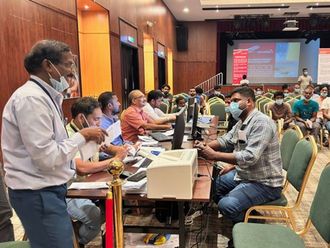
Dubai: It’s been over a year since the UAE implemented major reforms to its family law with the introduction of the Federal Personal Status Law (Federal Law No. 41 of 2022).
Gulf News spoke to a legal expert in Dubai to find out the impact of these reforms ever since.
The expert, Nita Maru, Solicitor (England & Wales), and Managing Partner of TWS Legal Consultants, said, “Reflecting on the past year, it is evident that the Federal Personal Status Law has brought about significant positive changes for expatriates in the UAE. By promoting gender equality, simplifying marriage and divorce procedures, and offering greater clarity in financial and custodial matters, the new law has enhanced the legal landscape for non-Muslim residents. These reforms align with the UAE’s vision of being a progressive and inclusive society, attracting talent from around the world and ensuring that all residents can live and work in a supportive legal environment.”
According to her, the key takeways of the changes are as under:
More emphasis on gender equality and justice
One of the key aspects of the new law is its emphasis on gender equality. Article 4 of the law ensures equal rights and obligations for men and women in areas such as witness testimony, estate distribution, and the right to divorce. This shift represents a significant move towards promoting justice and fairness, ensuring that both men and women have equal opportunities to exercise their legal rights.
Civil marriages simplified
The introduction of Article 5 has streamlined the process for civil marriages for non-Muslim expatriates. Previously, obtaining consent from the wife’s father or guardian and having witnesses present was mandatory. The new law has eliminated these requirements, allowing couples to declare their consent and sign a declaration form in front of a judge. This simplification has made it easier for couples to get married, reflecting a more progressive and inclusive approach.
Introduction of no-fault divorce
Articles 6, 7, and 8 bring the concept of no-fault divorce to the forefront. This means that either spouse can initiate a divorce without having to provide a reason or assign blame. The removal of the mandatory mediation sessions further expedites the process, allowing for some divorces to be granted at the first hearing. This change has significantly reduced the emotional and legal burden on couples seeking to end their marriage, making the process more amicable and efficient.
Fair alimony and financial provisions
Article 9 provides a framework for determining alimony, considering factors such as the duration of the marriage, the age and financial situation of each party, and the extent of the husband’s contribution to the divorce. This approach aligns with international practices and ensures a fair assessment of financial support, offering better protection for spouses who may be financially disadvantaged after a divorce.
Joint custody of children
One of the major changes this new law has brought about relates to the custody of children. The new law introduces the concept of joint custody, with Article 10 emphasising shared parental responsibility. In cases of dispute, the court will determine custody based on the best interests of the child. This progressive approach supports the well-being and safety of children, allowing for a more balanced and co-operative parenting arrangement.
A say in estate planning, inheritance matters
Article 11 addresses inheritance matters for non-Muslim expatriates, allowing them to draft a will to distribute their assets according to their wishes. In the absence of a will, assets are distributed between the surviving spouse and children, with gender equality in inheritance rights. This change has provided expatriates with greater control over their estate planning and ensures that their personal wishes are respected.













